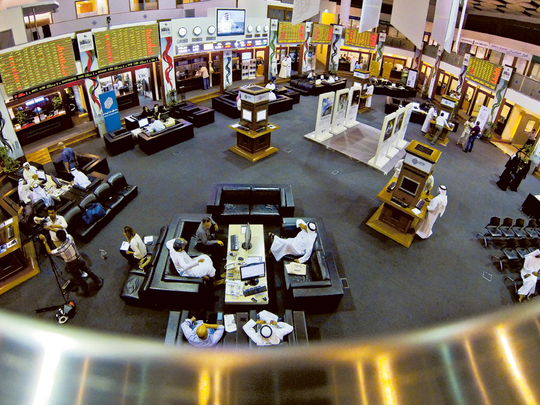
Dubai: The UAE markets are likely to move sideways next week after losing 6 per cent last week, with investors eyeing crude oil prices, which are near their break even point.
On Thursday, the Dubai Financial Market (DFM) General Index ended 0.12 per cent higher at 4,406.15, while the ADX general index ended 0.84 per cent lower at 4,790.28.
On the broader Dubai index, out of a total of 30 shares traded on the exchange, shares of 10 companies declined, while shares of 11 rose. On the ADX, out of a total of 34 companies, shares of 15 companies rose, while 12 of them declined and the other seven remained steady.
“I think we should move sideways next week. Volatility will go down. I don’t see it moving in one direction,” Sebastien Henin, head of asset management at The National Investor told Gulf News.
The Dubai index has gained 33 per cent so far in the year, mainly helped by hopes of further growth on the back of high expectations from construction and banking sector.
“I’m not expecting a lot of volatility, so volumes will automatically come down,” said Henin. On Thursday, volumes on the DFM fell to Dh815 million from an average of Dh1 billion.
In the September quarter, the value of shares traded on the DFM fell 38.2 per cent to reach Dh78.4 billion, though the exchange may stand to gain due to current market volatility.
Trading volumes in the real estate and construction sector was at Dh57.6 billion, or 73.5 per cent of the total traded value in the market. The banking sector ranked second at Dh9.6billion or 12.2 per cent.
Crude oil
“Crude oil would definitely be a hot topic in the market. We are very close to the break even point in crude oil prices, that could have turbulent impact on finances,” said Henin.
The break even for crude oil, which has shed more than a quarter of its value, in 2014 has been pegged at $80 (Dh293.8) per barrel.
On Thursday, crude oil extended losses after a Libyan official said the country’s biggest field would restart and Opec cut demand forecasts for its crude.
Meanwhile, demand for crude from the Organisation of Petroleum Exporting Countries may fall to a 14-year low of 28.2 million barrels a day in 2017, according to the group’s annual World Oil Outlook. That’s a cut of 600,000 a day from last year’s report and 800,000 below the amount required this year.
“If crude oil prices continue to fall down, it would have an adverse impact on equity markets,” said Henin.












